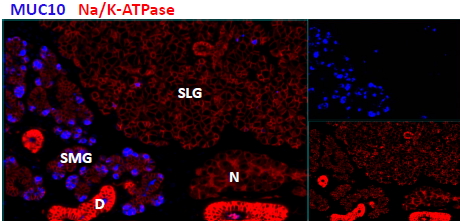Formulation Supplied at 0.5 mg/ml in Tris saline, 0.02% sodium azide, pH7.3 with 0.5% bovine serum albumin.
| |
Unit Size 100 µg | |
Storage Instructions Aliquot and store at -20°C. Minimize freezing and thawing. | |
Synonym / Alias Names mucin 10, submandibular gland salivary mucin| mucin 10| Muc10| proline rich, lacrimal 1|Prol1 | |
Usage Summary Immunofluorescence: This antibody has been successfully used in IF on Mouse: Vaishali N Patel et al. (2021) PMID: 34653670, and Peluso G et al. (2019) PMID: 31882545.
Immunoprecipitation: This antibody has been successfully used in IP on Mouse: Peluso G et al. (2019) J Biol Chem. 2019 Dec 27. pii: jbc.RA119.009807. PMID: 31882545. | |
Accession ID NP_032670.2 | |
Blocking Peptide EBP10617 | |
Immunogen Peptide with sequence C-QFPVRKYLEDPRY, from the internal region of the protein sequence according to NP_032670.2. | |
Peptide Sequence C-QFPVRKYLEDPRY | |
Purification Method Purified from goat serum by ammonium sulphate precipitation followed by antigen affinity chromatography using the immunizing peptide. | |
Shipping Instructions Refrigerated | |
Predicted Species Mouse | |
Reactive Species Mouse | |
Mouse Gene ID 17830 | |
Product Grade  | |
IHC Results Positive staining in the submandibular salivary gland of the mouse, while cells remain negative in the sublingual salivary gland. Data provided by Everest Grant winner Melinda Larsen State University of New York, Albany, NY. A publication from this author includes the use of this antibody: Nelson at al, Biol Open. 2013 Apr 18;2(5):439-47, PMID: 23789091. This antibody has been successfully used in IHC on Mouse, PMID: 37838739. | |
ELISA Detection Limit Antibody detection limit dilution 1:32000. | |
Western Blot This antibody has been successfully used in WB on Mouse: Peluso G et al. (2019) J Biol Chem. 2019 Dec 27. pii: jbc.RA119.009807. PMID: 31882545. | |
Application Type Pep-ELISA, WB, IHC, IF, IP |
Goat Anti-Mucin 10 / Prol1 Antibody
$431.00
| SKU | Unit Size | Price |
|---|---|---|
Select a unit size:
Selected References [{"pmid": 23789091, "intro": "This antibody has been successfully used in IHC on Mouse:", "title": "Quantitative single cell analysis of cell population dynamics during submandibular salivary gland development and differentiation.", "author": "Nelson DA, Manhardt C, Kamath V, Sui Y, Santamaria-Pang A, Can A, Bello M, Corwin A, Dinn SR, Lazare M, Gervais EM, Sequeira SJ, Peters SB, Ginty F, Gerdes MJ, Larsen M.", "journal": "Biol Open. 2013 Apr 18;2(5):439-47."}, {"pmid": 31882545, "intro": "This antibody has been successfully used in WB, IF and IP on Mouse:", "title": "Loss of the disease-associated glycosyltransferase Galnt3 alters Muc10 glycosylation and the composition of the oral microbiome.", "author": "Peluso G, Tian E, Abusleme L, Munemasa T, Mukaibo T, Ten Hagen KG", "journal": "J Biol Chem. 2019 Dec 27. pii: jbc.RA119.009807"}, {"pmid": 36413949, "intro": "This antibody has been successfully used in the following paper:", "title": "Neuronal-epithelial cross-talk drives acinar specification via NRG1-ERBB3-mTORC2 signaling.", "author": "Alison J. May et al.", "journal": "Developmental Cell 57, 2550-2565 (2022)"}, {"pmid": 34653670, "intro": "This antibody has been successfully used in IF on Mouse:", "title": "Loss of Hs3st3a1 or Hs3st3b1 enzymes alters heparan sulfate to reduce epithelial morphogenesis and adult salivary gland function.", "author": "Vaishali N Patel et al.", "journal": "Matrix Biol. 2021 Sep:103-104:37-57."}, {"pmid": 37838739, "intro": "This antibody has been successfully used in IHC on Mouse:", "title": "FGFR2 is essential for salivary gland duct homeostasis and MAPK-dependent seromucous acinar cell differentiation.", "author": "Marit H. Aure, Jennifer M. Symonds, Carlos U. Villapudua, Joshua T. Dodge, Sabine Werner, Wendy M. Knosp & Matthew P. Hoffman", "journal": "Nat Commun. 2023 Oct 14;14(1):6485."}] |
Documents |

